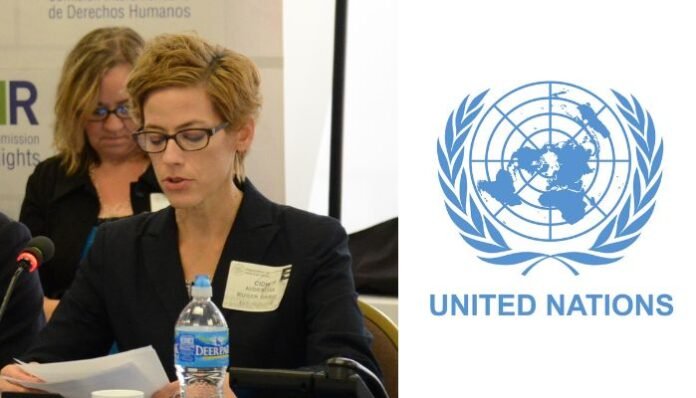
Margaret Satterthwaite, the United Nations special rapporteur on the independence of judges and lawyers, expressed deep concern over the deteriorating state of judicial independence and human rights in Turkey, in a letter to the Turkish government.
The letter highlighted concerns over the arrest and judicial harassment of lawyers and human rights defenders as well as the significant political interference that has compromised the judiciary’s impartiality since a 2016 failed coup.
The letter was prompted by reports of a “systemic lack of due process guarantees” in terrorism-related cases.
Satterthwaite described the situation in Turkey as “deeply concerning,” citing “mass dismissals, arbitrary detentions, and systemic interference” in the judiciary. “If these reports are confirmed, this course of action would constitute a violation of international human rights standards regarding the right to a fair trial and the independence of the judiciary,” she said.
Following an abortive putsch on July 15, 2016, the Turkish government removed more than 4,000 judges and prosecutors from their positions without due process, many of whom faced criminal charges under Turkey’s broad anti-terrorism laws. Satterthwaite pointed out that many arrests “were not based on any evidence” of criminal activity.
The Turkish government claims these individuals were affiliated with the Gülen movement, inspired by US-based Muslim cleric Fethullah Gülen, which Ankara blames for the coup attempt. Gülen and the movement deny any involvement.
Satterthwaite also criticized Turkey’s legal framework, which allows for judges to be dismissed based on vague accusations of affiliation with groups deemed a threat to national security. “This vague and over-broad formulation creates a great potential for the arbitrary dismissal of judges in violation of guarantees of judicial independence,” Satterthwaite said, noting that more than 1,000 applications from dismissed judges remain pending before the European Court of Human Rights.
Turkish President Recep Tayyip Erdoğan has been targeting followers of the Gülen movement, since the corruption investigations of 2013, which implicated then-prime minister Erdoğan, his family members and his inner circle.
Dismissing the investigations as a Gülenist coup and conspiracy against his government, Erdoğan designated the movement as a terrorist organization and began targeting its members. He intensified the crackdown on the movement following the abortive putsch in 2016.
The complaints received by the rapporteur also include concerns about the treatment of lawyers, particularly those defending clients accused of terrorism. “Lawyers and human rights defenders in Diyarbakır are facing arrests and judicial harassment,” the letter states, with many being prosecuted “for exercising their profession and defending their clients.”
Satterthwaite emphasized that these actions represent “a serious breach of international and regional standards relating to the free and independent exercise of the legal profession.”
The letter also took aim at the use of ByLock, once widely available online, which has been considered a secret tool of communication among supporters of the movement since the coup attempt on July 15, 2016, despite the lack of any evidence that ByLock messages were related to the abortive putsch.
“Considering the alleged number of cases that have used this data as evidence for conviction,” Satterthwaite wrote, “I join others in expressing concerns over the process of acquisition and analysis of the ByLock data.”
The special rapporteur called for retrials in all cases where ByLock evidence was used and for the implementation of safeguards to address the disparities in the use of digital evidence in terrorism-related prosecutions.
In her letter Satterthwaite posed a series of questions to the Turkish government, seeking clarity on several critical issues. She specifically asked about the measures Turkey has taken to address concerns related to the use of ByLock evidence in terrorism-related prosecutions.
The special rapporteur asked the Turkish government to ” indicate the measures taken to address the concerns expressed in the use of ByLock evidence” and called for safeguards to ensure the reliability of digital evidence used in courts. She stressed that the widespread use of this controversial evidence without proper judicial oversight has jeopardized fair trial guarantees for many defendants.
Satterthwaite also inquired about the actions Turkey has undertaken to ensure that individuals facing terrorism charges receive a fair trial, particularly with access to an independent and impartial tribunal. She asked Turkish authorities to “indicate the measures taken to ensure the guarantees of a fair trial in these cases.”
Expressing concern over the hostile environment for human rights defenders and legal professionals in Turkey, the special rapporteur also urged the government to explain what steps have been taken to protect lawyers and human rights defenders from harassment, intimidation and criminalization for carrying out their legitimate professional activities.
The special rapporteur warned that if the current trajectory continues, it could lead to the collapse of the rule of law in Turkey. She called on Turkey to halt actions that undermine judicial independence and ensure that judges, prosecutors and lawyers are able to perform their duties without fear of reprisal.














